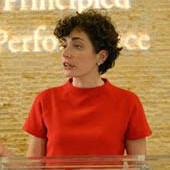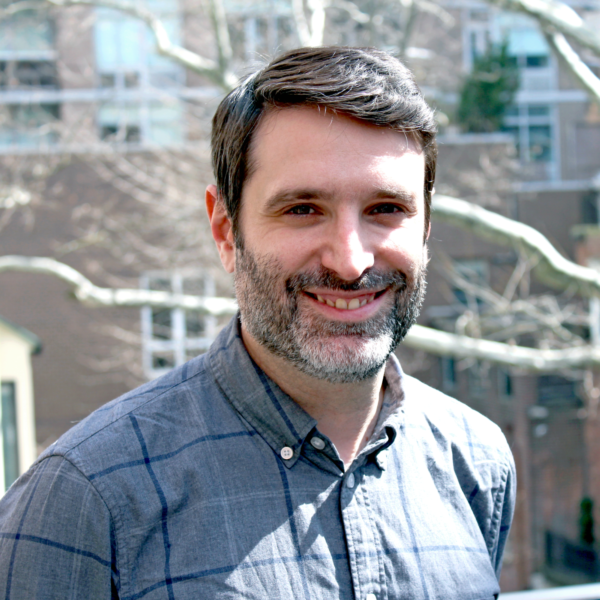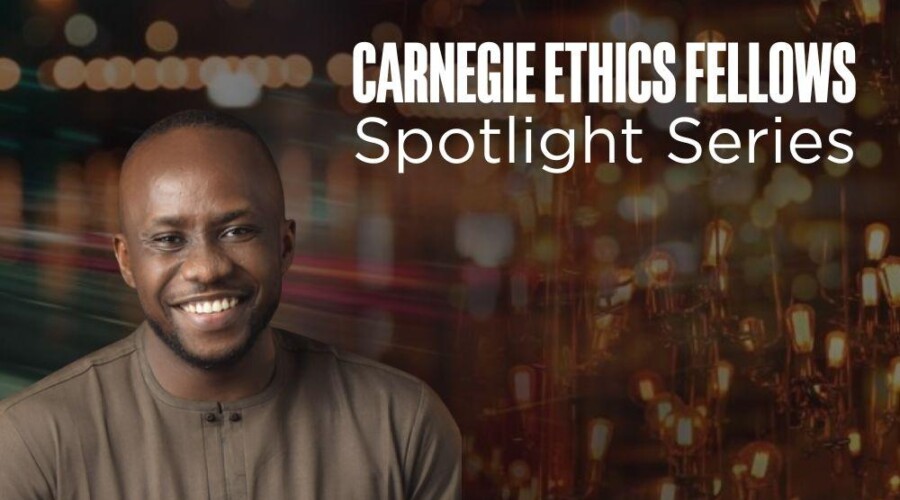Veterans face life-or-death challenges during their military service, but adjusting to a life in the workforce can be even trickier for some. Just in time for Veteran's Day, Julia Taylor Kennedy discusses her new book "Mission Critical," which offers in-depth research and tangible solutions on this important and under-reported issue.
ALEX WOODSON: Welcome to the Carnegie New Leaders podcast. My name is Alex Woodson. The Carnegie New Leaders Program provides enrichment opportunities for the next generation of leaders who are interested in exploring the ethical dimensions of issues relating to business, foreign policy, and economic development.
Today I am joined by Julia Taylor Kennedy, former program coordinator for Carnegie New Leaders. Currently Julia is senior vice president and senior fellow at the Center for Talent Innovation and the host of the Carnegie Council podcast Impact: Where Business and Ethics Meet. Along with Michael Abrams, Julia is the co-author of the new book Mission Critical: Unlocking the Value of Veterans in the Workforce.
Thanks for coming today, Julia.
JULIA TAYLOR KENNEDY: Absolutely. My pleasure.
ALEX WOODSON: To start, why don't you tell us how you got interested in this topic and just talk about your familiarity with veterans' issues before you started writing this book.
JULIA TAYLOR KENNEDY: It is a great question. The topic actually found me. The Center for Talent Innovation focuses on gender and diversity in the workplace. We do reports, studies, books on all kinds of different topics that face different talent pools in corporate workplaces. My background actually is mostly around gender. What the Center for Talent Innovation has given me an opportunity to do is explore a lot of different talent pools in the workplace.
They had already, when I joined, started this work around veterans. A former colleague at the Center for Talent Innovation, who is now just an advisor there and my co-author on this book, Michael Abrams, is a Marine in the reserves. It is an area of passion for him. For years, the Center for Talent Innovation was trying to figure out the right topic to home in on this cohort.
A few years ago, there were a lot of headlines around how veterans aren't getting hired. Then last week we saw a headline saying that veteran unemployment has hit the lowest level, which has been dropping for the past five years. It is at 3.9 percent now. That is a lot thanks to a policy that President Obama put in place with Congress—one of the few things they have been able to work together on—to give tax breaks to large corporations for hiring veterans.
So veterans are being hired in large numbers. It is a wonderful victory for this country. But there is very little research out there on then what happens once veterans get into their corporate jobs. We in fact find that companies aren't really making good on that recruitment investment that they put into bringing veterans into their workforces.
ALEX WOODSON: Could you explain a little bit more about that? How are they not making good on that commitment?
JULIA TAYLOR KENNEDY: Sure. What we ended up doing was surveying about 1,000 veterans across the United States. I interviewed upwards of 40 more, and we conducted a few focus groups to understand what the reality is for veterans. What we learned is that once they are in that seat in their corporate job, they have an amazing skill set that they developed in the military, a lot around making quick decisions under pressure, because they have had to do it under enormous pressure in the military, a lot around giving feedback to others, communicating with others. So they have this great set of skills, and they tell us they are ambitious. But 57 percent report that they are not looking to rise to a more senior position. We thought, "Huh, that's weird." And of the remainder, a big chunk feel stuck and stalled.
The reason for that, we find, is that they are in fact invisible to senior leadership at their organizations. People around them don't really know what type of value-add veterans have, what types of real transferable skills they have once they get into their corporate jobs. Often they tune out, in fact, or they stall out, and they stay at that individual contributor level, even though they come to the workplace with all kinds of leadership skills.
ALEX WOODSON: That is one of the issues that I thought was particularly interesting. Another issue that I saw that I hadn't thought about at all was how veterans cover or downplay their military service. One veteran said that he would squirm when people thanked him for his service.
What did you find in regard to that?
JULIA TAYLOR KENNEDY: That is a great question. It is something that is a change in how veterans view their relationship to others in society. After the Vietnam War, there was such hostility from certain corners towards veterans that there was a real movement to say we need to thank our veterans for their service. They made an amazing sacrifice for us, to defend our country.
Today the reality is a little different. Often veterans say they prefer not to be thanked. From the greatest of intentions, we as civilians want to thank someone who we know went out and served in the military. But often that can feel alienating. It can feel like you are being singled out as a veteran for doing something that you consider to be your duty for your country.
There are lots of articles on this phenomenon. Actually this guy isn't alone in saying he doesn't really know how to respond when people thank him for his service. But more broadly, when we look at veterans downplaying their identities at the workplace, it is an interesting phenomenon. We use the word "cover," which was actually coined by Kenji Yoshino. He is a law professor who is also an advisor to the Center for Talent Innovation. He coined it in relation to LGBT [lesbian, gay, bisexual, transgender] talent in the workplace. They may be out at work, but they are downplaying their identity so that they don't incur stereotypes or false assumptions from colleagues, to fit in once again.
We find the same thing with veterans. Forty-nine percent of veterans told us that they are confronting false assumptions at the workplace. Then we asked, what kinds of assumptions do people make about you? What we heard are things that describe that single kind of soldier that we see in movies and media, which is gun enthusiast, things like "has killed someone in combat," politically conservative—these assumptions that, again, can make the veteran feel alienated in the workplace.
When you think about veterans, they are used to having really deep camaraderie with their colleagues in the military. So the instinct to cover their military experience and try to fit in and be one with their colleagues in the corporate workplace makes a lot of sense.
ALEX WOODSON: Definitely. Just going off that, one other section that I thought was particularly interesting was that the veterans coming back had to be taught how to talk differently and act differently. When they are in the military, their decisions can—the wrong decision can mean people die. In the workplace it is a little different. They are a lot more direct and kind of brutally honest in some cases than their colleagues are. That might have worked against them a little bit.
JULIA TAYLOR KENNEDY: Yes, I think it is a style question. There are deep skills—there is the ability to kind of motivate people and build a team—that are applicable in both environments. But when you are talking about the corporate environment, buy-in is really important to try to get things done. People are slower to make decisions.
Linda Huber, who is CFO of Moody's, wrote the foreword to the book. It was very interesting to hear her talk about how she was raised in a military family. Her dad was a general. So she grew up with this very direct communication style. Then she was an officer in the military, making decisions, as you indicated, to her direct reports about whether to send them on a long march because they might endure heat exhaustion in a training exercise—something that wasn't even in combat, but still had dire consequences for the folks under her command.
She gets out of the military and goes to business school. To us, to me, when I was in graduate school, a paper could be very stressful. You want to please your professor. There is a deadline you need to meet. But for her, this stuff was a breeze. It didn't have nearly the stakes that she was encountering in the military. She looked around and saw the other students really upset over their papers if they got a bad grade or trying to meet a deadline, and she realized there was this disconnect. So very early on in her career, she worked to fix that. She joined a women's support group, mostly just to hear what women's concerns were and trying to develop patience and empathy. She said that pays off today in her career.
She thinks one of the strengths she brings in the workplace is that she makes very quick decisions and is able to assess a situation and understand which way to go very quickly. But she has developed more patience for others who aren't able to reach that conclusion as quickly as she is, and that pays off day to day.
ALEX WOODSON: A few months ago, I talked to another Carnegie New Leader, a veteran, Jayson Browder, about the same issue. He founded an organization called Veterans4Diplomacy, which helps out with veterans looking for foreign policy jobs and diplomacy jobs. He actually went to Fordham, which is mentioned in the book as one of the places that is doing really good work in this community. He said that two of the things that helped him to succeed in the professional world were mentors and finding scholarships and fellowships. Did you find this to be the case in your research as well?
JULIA TAYLOR KENNEDY: That is a great question. It actually dovetails exactly with what I was saying. Linda Huber provided that insight for herself, but I think with mentors, organizations can give new veteran recruits the feedback they need to modify their style, to thrive in the corporate workplace. So I completely agree with that. And I don't think that the mentor necessarily needs to be a veteran. Sometimes civilians are your best sounding board and have that other perspective on your behavior and your delivery and can give you the kind of feedback that you might need.
We at the Center for Talent Innovation see mentorship as distinct from something else that we call sponsorship. The way we define a mentor is someone who gives you feedback, gives you advice, who you can come to with your problems in a really safe space and get help. It seems like that is exactly how Jayson saw a mentor playing a role, too.
But what we think is even more important to leverage your career, to get up to the next level in your company is a sponsor. How we define a sponsor is someone who is going to advocate for your next promotion even when you are not in the room. Sponsorship is pretty rare. We find that 19 percent of men across the board generally have sponsors, 13 percent of women. We checked how many veterans have sponsors. Two percent of the veterans in our sample had sponsors. It is a much smaller number that have that key advocate helping them climb the corporate ladder.
We think that with more feedback, more mentors in fact, veterans can get on the radar of those sponsors, because I think it is that stylistic difference. I asked several senior leaders, "Why do you think this finding came in so low?" What I heard was sometimes veterans' style sticks out. It doesn't seem to fit in. It doesn't signal they are ready for leadership in a corporate context. But it is just a style shift. They come in with so much training and ability to galvanize support, to push people to new frontiers, from the military that if it is kind of smoothed over, those rough edges, they can really thrive in a corporate context.
ALEX WOODSON: You were saying before that your area of focus has been gender in a lot of employment issues. What challenges do female veterans face that male veterans might not face? What are some of the differences that those two groups encounter?
JULIA TAYLOR KENNEDY: We spent a lot of time looking at this because it is of personal interest to me and also of interest to our organization. We were also very keen to understand where important differences are in the veteran population. We found some interesting differences if they had a disability, if they were veterans of color, if they were women—not so much between officers and enlisted, which was interesting. We expected for every finding we would have a finding for officers, a finding for enlisted. That didn't pan out. They came with very similar challenges and skill sets.
For women, we had two interesting findings. The first was that they have a deeper desire for meaning and purpose from their careers. This is consistent with what we have found with women across the board. Veterans really want to serve society as part of their jobs. That makes a lot of sense, because that is why they joined the military in the first place. Women veterans have an even deeper desire for this. The minority of all veterans say they have an unmet need for meaning and purpose from their corporate jobs. With women, it is the majority.
I interviewed several women about this. They said they had switched jobs in order to find something with more purpose. Some of them were mentoring other veterans to try to fill that need or were volunteering in their community. So that was one interesting finding, that they really desire this meaning and purpose from their jobs.
Another interesting finding—and this is a silver lining for corporations—was that women encounter far less sexism in the workplace. In fact, they encounter 50 percent more sexism in the military. So that is a great relief for a lot of women. I heard lots of stories about rough comments that were being made in the military that went away in the corporate atmosphere. It is a complicated story. Women say it was more sexist in the military and yet they miss the same things that their male counterparts miss. They miss the camaraderie. They miss the clear pathways to advancement. They face negative assumptions in the workplace based on their military experience.
So it is a similar narrative, but there is that sort of silver lining around less sexism and that deeper hunger for meaning and purpose.
ALEX WOODSON: It is really interesting. Any insights like that about people of color as opposed to Caucasian people that you found?
JULIA TAYLOR KENNEDY: Yes. What stuck out to us among people of color was around the covering, which is that people of color cover more. As we thought about it—we saw the number first and then, again, we went back to interviews and tried to think about why this might be so. What we heard was that there are two sets of assumptions that people of color face in the workplace, one around their race or ethnicity and the other around their military experience. Which is easier to downplay? The military.
I interviewed one guy, I call him James in the book—we anonymized a lot of these veterans because we wanted to protect their career advancement and not give another ding—James was a sniper in the military. A big guy. Very good-looking. Very successful in the military. But he has had real challenges in his career post-military, because he feels that people treat him differently, both based on his race and based on his military experience.
He has built a career in diversity, so there is no way he is downplaying either identity. But he has some really hard stories about being invited over to a boss' house just to roughhouse with his kids or being invited back to interview for a position that the recruiter really had no intention of hiring him for but wanted to hear his war stories, number of confirmed kills as a sniper in the military.
The way that James has managed to move up in his career, because he has felt very stalled at the different organizations where he has worked, is to switch employers every three years. That often comes with a bump in salary and promotion. That is how he is navigating it. But it has been really hard for him to learn that. It is an unsettled lifestyle. Often it comes along with a geographic move as well.
ALEX WOODSON: Have you noticed veterans jumping jobs more than non-veterans? Did you find that in your research?
JULIA TAYLOR KENNEDY: That is a great question. We have not found that. Actually, we found that veterans are incredibly loyal, but they are not moving up. Every once in a while—I mentioned women that I heard had changed jobs to try to find meaning and purpose. I mentioned James, the former sniper, who is jumping and has figured that strategy out. But in general we did not learn that.
ALEX WOODSON: What are some insights that surprised you, some stuff that we haven't covered that you really want to highlight?
JULIA TAYLOR KENNEDY: I guess a big learning for me, and I think in general for the civilian population, is this idea that we think of veterans as having worked in an organization where they are on board quickly, they are moved around a lot, they might be used to switching jobs. But because everything is mapped out so clearly in the military—there are automatic promotions every two years and then maybe quicker promotions if you perform well, intermittently—the politics and the relationship capital that goes into moving up in a corporate setting is a huge mystery to veterans.
I spoke to one veteran, I called him Juan in the book. He was a Marine officer. He actually entered the military in order to gain leadership skills. He graduated from college, wanted to become a corporate manager, and thought, "I don't have the skill set I need to do that, so I'm going to join the military." He served his tour of duty. He deployed, was doing incredibly well leading 150 Marines. His fondest memory was in fact when he was changing his leadership style, modifying it to fit the needs of his direct reports. Whether he was working with someone who really needed discipline and needed to be told where the boundaries were and what to do, he would give that direct report that. But he might have someone else who was really struggling with homesickness or having issues with a relationship with another Marine. In that case Juan would sit down and ask him about the problem and help him work through it. He loved doing that and it was really his passion.
Fast-forward seven years. He has an MBA. He is working in a major corporation, but Juan is still an individual contributor. He is incredibly disengaged. He says to me, "I hate staring at an Excel spreadsheet day after day. I'm not doing what I want to do. I went to all these lengths to try to gather the skills I need." But he also has no idea how to approach his manager to move up. He goes, "I'm waiting for them to tell me what my next promotion is."
I think this happens to so many veterans. They are so used to doing what they are told and expecting a reward. That is just, unfortunately, not how the corporate world works.
ALEX WOODSON: I mentioned Fordham before, which you talk about in the book as doing a good job in some ways in helping veterans. Could you explain a little bit exactly what Fordham is doing, maybe talk about some other companies that are doing good work in this community?
JULIA TAYLOR KENNEDY: Yes. That is a great question. Fordham University has a lot of initiatives with their veteran students to help connect them to jobs. They are doing really good work on that hiring piece and then also working with students to understand "what career do I want?" I think a lot of folks get their VA [United States Department of Veterans Affairs] benefit, they go to school, and then they snap up the first job they get, and it may set them down a career path that they weren't initially passionate about. Fordham is doing more and more work to help them figure out "what career do I want" beyond just "what job do I want."
There are a lot of corporations that are experimenting with different ways to engage veterans. The New York Stock Exchange—now it is the New York Stock Exchange ICE [Intercontintental Exchange]—they piloted a program for veterans that really connected them to senior leaders and to mentors. They were both getting in front of people who could then help them on a leadership track and getting that feedback early on, on how they were doing.
Prudential is doing something really interesting. They are partnering with current students to connect them to a meaningful internship that has a job attached at the end. I think that is so smart. They are working in a team. Sometimes they rotate team to team. But they end up working in a team that will then turn into a guaranteed job, unless they mess up in some dire way. It is a really good on-ramp to a job straight from school. With that rotation element, the veteran is also testing out different parts of the corporation where they feel a fit. So that is a really interesting one.
Booz Allen hires a ton of veterans. It is definitely more than half, it might be up to three-quarters of their employees are veterans, because they are a government contractor. They have done a lot of things over the years. About 10 years ago, when there was a big surge, Booz Allen hired a lot of officers, a lot of really senior-rank officers, to understand how to get into the cybersecurity space and grow certain pieces of their business. What they learned at that time was this idea that just because senior-rank officers are really good at military strategy doesn't mean they will be as good at corporate strategy. So they figured out a way to put these senior officers in charge of a team with a very direct mission, so they could learn the business, do a project that worked really well, and then move into a more strategic role. I thought that was a really interesting insight.
But in general, what we are encouraging corporations to do is to celebrate veterans' experiences more, to make them really aware of the fact that they bring to the workplace a differentiator and to use that to their advantage over the course of their civilian career as well—meanwhile, to also approach awareness and make their colleagues aware of the strengths that they bring, to debunk some of those false assumptions and make it a more welcoming and inclusive culture for people to bring their unique set of skills, their unique backgrounds in their core functions on the job.
ALEX WOODSON: One other thing that Jayson Browder talked about was that he has seen that veterans coming back from Afghanistan and Iraq may be a little bit more entrepreneurial than veterans have been in the past. I know you mentioned Team Rubicon in the book. They do disaster relief with veterans. He thought that was an interesting point, too. I think that is a pretty positive way to go as well.
JULIA TAYLOR KENNEDY: Sure. And I did interview a couple veteran entrepreneurs as well. I think that in terms of setting direction and being clear-eyed about how to meet a goal, that is a really good point.
ALEX WOODSON: Yes, definitely. One other point that is mentioned in the book that makes it even more difficult for veterans coming back is having disabilities. What did you find out about that in your research?
JULIA TAYLOR KENNEDY: It is a tough story. I think any employee with a disability struggles with how much to disclose about their disability at work. As I mentioned with veterans of color, I think veterans with disabilities face two sets of false assumptions in the workplace.
What we found was that in fact 30 percent of the veterans with disabilities in the corporate workplace have not disclosed that disability. It's a big number. And it cuts them out from accommodations that could make them far more effective.
One veteran who I call Rufus in the book has chronic migraines, in addition to a traumatic brain injury and a couple of other challenges that he is working with. He has disclosed some of them, but he hasn't told his employer about the chronic nature of the migraines, which are triggered by bright lights. He is dealing with this every day. His response is to work through it and excel as he can at his job. But one can only imagine that if he were able to work in dim lighting conditions with a screen that was appropriate for someone who suffers from these chronic migraines, he could perform even better daily on the job.
I think this really kind of crystallizes some of the lost productivity on the company's part and some of the difficulties of daily life on a disabled veteran's part.
On the flip side, I interviewed another veteran who has really severe PTSD [post-traumatic stress disorder]. He has tried a lot of different therapies to deal with it in the workplace. His employer is aware of it, but a lot of his colleagues weren't aware of his PTSD. Eventually he got to the point where he wanted to start bringing his therapy dog with him to work. He wanted to let his colleagues know why this dog would be at his side. So on an all-hands call at this major, major company, he talked about his PTSD, the therapy dog, and why the therapy dog would be accompanying him. He was really worried about this, understandably. He didn't want to be discounted. He didn't want to cut himself off from potential promotions or other opportunities at work.
But what he found was that the reaction to this all-hands call—long-term, we don't know what the impact is—short-term, after this all-hands call, he had responses flooding in from all corners of the company in support, sort of saying, "What can I do to help you?" and also from other folks who suffer from PTSD, veterans and non-veterans. Victims of sexual trauma were asking him for resources and pointers for where to go to try to deal with their own PTSD.
For him, it really connected him to a sense of meaning and purpose every day on his job. He talked about how he has this renewed passion and renewed connection to his employer because he is able to provide this support to his colleagues, where he felt incredibly distanced from everyone in his life due to his PTSD.
So it has been therapeutic for him on all kinds of levels and is another sign that encouraging people to bring their full selves to the workplace can be beneficial both to the employer and to the employee.
ALEX WOODSON: Definitely.
That's about all I have. Thanks for coming, Julia. This has been a great discussion.
Again, this was Julia Taylor Kennedy. My name is Alex Woodson. The book is called Mission Critical. Is it available now?
JULIA TAYLOR KENNEDY: It is available now on Amazon, both as an ebook and as a book. And thank you so much for having me. It was a treat to talk about it.
ALEX WOODSON: Of course. Thanks again. Thanks for listening.





